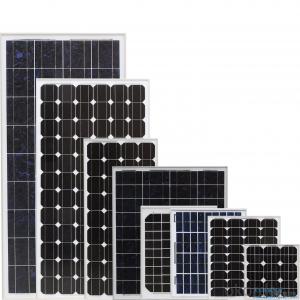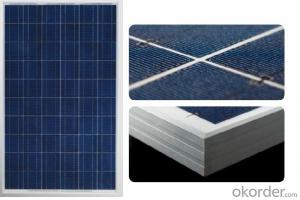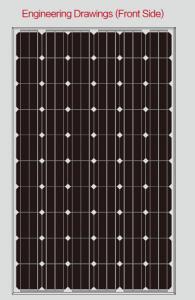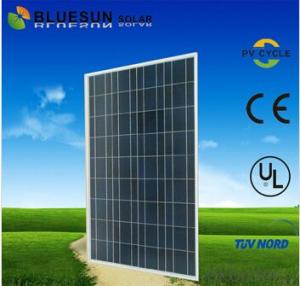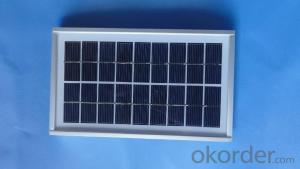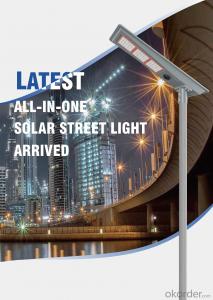Solar Modules (Poly-Crystatline solar Panel)TPB156×156-54-P
- Loading Port:
- Ningbo
- Payment Terms:
- TT OR LC
- Min Order Qty:
- 100 carton
- Supply Capability:
- 10000 carton/month
OKorder Service Pledge
OKorder Financial Service
You Might Also Like
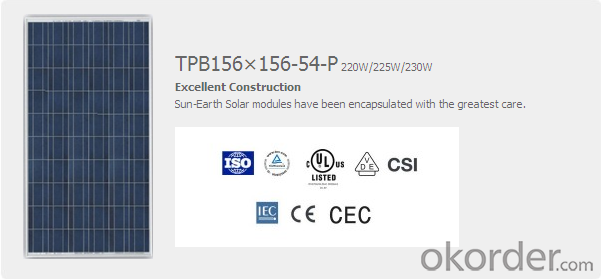
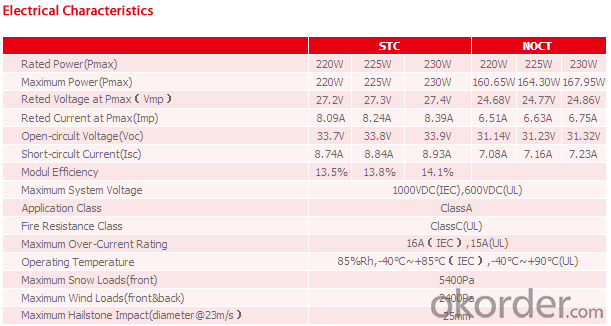
Specification:
· Highest performance enabled by higher efficiency monocrystal line cells and the latest Solar Wafer Technology for multicrystal line cells
· Lower weight design which reduces the total system load on a roof, making it ideal for residential customers. Its shape allows for better roof utilization
· Its low weight means easier handling for installers
· Modules are designed to withstand PID (Potential Induced Degradation)*
· High light transmission Anti-Reflective Glass with improved self-cleaning capability
· 0/+5 W Positive power tolerance for reliable power output
Warranty
CNBM Solar provides one of the most comprehensive module warranties in the industry:
· 10 years for product defects in materials and workmanship
· First 12 years for 90% of warranted minimum power
· Remaining 25 years for 80% of warranted minimum power
Certification
CNBM Solar strictly carries out the ISO 9001 quality control methodology and has implemented check points at every step of the production process to ensure our product performance durability and safety. The stringent quality control process has been confirmed by numerous independent agencies and LDK Solar modules earned IEC, TUV and UL certifications.
· IEC:IEC 61215, IEC 61730 (1&2), conformity to CE
· UL 1703 2002/03/15 Ed:3 Rev:2004/06/30
· ULC/ORD-C1703-01 Second Edition 2001/01/01
· UL and Canadian Standard for Safety Flat-Plate
· ISO 9001: 2008 Quality Management Systems
· CEC Listed: Modules are eligible for California Rebates
· PV Cycle: Voluntary module take back and recycling program
· MCS Certificate
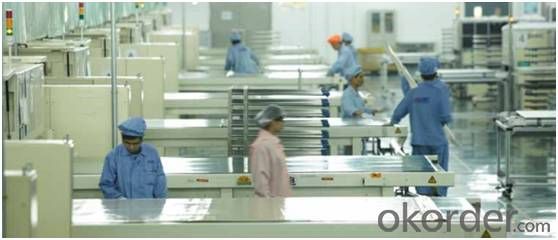
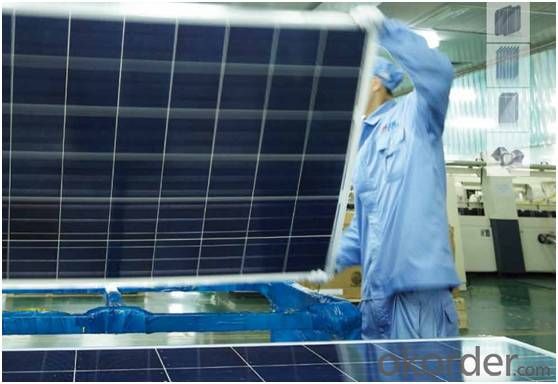
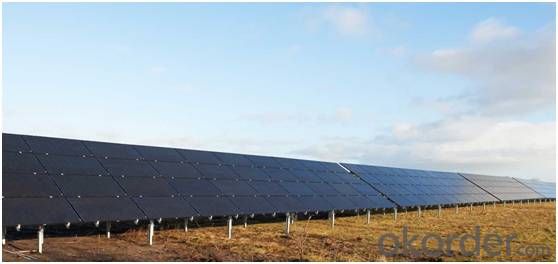
FAQ
1. How do I decide which system is right for me ?
For protection from long outages, include a generator or solar panels in your Must solar system. Shorter outages can be handled by a battery-only system.
2. Where my system will be installed ?
Must solar systems are usually wall-mounted near a home's main electrical (circuit breaker) panel.
3. How do I install my system ?
A must solar backup inverter is connected to a home electric system , we will supply detailed installation manual and videos for our customers .
How fast will my system respond to a power outage ?
Must solar inverters typically transfer to battery power in less than 16 milliseconds (less than 1/50th of a second).
What kind of batteries do the systems include ?
Must solar backup electric systems use special high-quality electric storage batteries.
- Q:Hi, I am starting to get curious about the pros/cons of installing solar panels - has anyone done it and is it worth it?
- If okorder and I mention them only because they did a retro fit on my Uncle's house in the Florida Keys and a smaller scale system for my in laws outside of Chicago. Both my Uncle and In Laws really are enjoying the cost savings that they are getting each month from their respective systems, and both said that Sun's initial costs were QUITE low. Be sure to have the blessing of your local building zoning departments before installing the panels as some municipalities take issue with solar panels. Also make sure that your roof is strong enough to withstand the weight of not only the panels, but the bracing. Good Luck.
- Q:What are the benefits of using solar panels?
- There are several benefits of using solar panels. Firstly, they provide a clean and renewable source of energy, reducing the dependence on fossil fuels and decreasing carbon emissions. Solar panels also help to lower electricity bills by generating free electricity from sunlight. Additionally, they require very little maintenance and have a long lifespan, making them a cost-effective investment. Furthermore, solar panels can increase the value of a property and provide energy independence, especially in remote areas or during power outages. Overall, using solar panels promotes sustainability, saves money, and contributes to a greener environment.
- Q:i need someone to advice me which solar panels to buy.i have looked into few companies and i need some more info before decidingthe companies i checked were Sun tech trina solar Canadian solar and LDK solar.whice company should i pick?? please help.
- If all things are equal buy local. If you are building for a LEED project then choose a manufacture within 500 miles. Another reason to choose a local panel is that if things go wrong there is a better chance of a satisfactory resolution. A no name knockoff from overseas might prove to be difficult to find a few years down the road. One good place to check is the Go Solar California website. They have proof of performance testing on hundreds of panels.
- Q:Do solar panels require a battery for energy storage?
- No, solar panels do not require a battery for energy storage. However, if you want to store the excess energy generated by the panels for use during non-sunny periods or at night, a battery storage system can be installed.
- Q:I thought that I had a fairly good understanding of watt's law, but i'm starting to doubt myself.If I have a load of 4500watts at 240 volts, how many watts of solar panels do I need, if the solar panels are at 2v?Yes, Yes... I have a charge controller, batteries, etc...So the way I looked at this at first:watts = volts * amps For the load4500 = 240 * xx would be 8.75aFor the power source (each solar panel)00 = 2 * xx would be 8.3a8.75 / 8.3 = 2.25, rounded up = 3So... based on that I came to the conclusion that I needed 3 solar panels...But... then I was thinking. Does it work that way?Or do I need 4500 / 00 = 45, aka 45 solar panels?In other words...If I have a 2v power source, how many watts do I need to drive a load of 4500w at 240v?ThanksMatt
- You okorder / Solar Pro Magazine another of their publications
- Q:Can solar panels be installed on a sloped roof?
- Yes, solar panels can be installed on a sloped roof. In fact, sloped roofs are quite common for solar panel installations. The angle and direction of the slope can affect the efficiency of the panels, so it is important to consider the roof's orientation and shading when planning the installation.
- Q:If one buys tons of solar panels and sells electricity(possible in my country) can he earn money ?
- there's some distinctive varieties of image voltaic panels. a number of them are basically for amassing warmth, they're quite low priced and not a bad deal, nonetheless installation might nicely be high priced of direction. the main state-of-the-paintings of those use some quite extreme tech creditors to warmth up an antifreeze answer that in the time of turn is circulated with the aid of a reservoir (how water heater), to furnish the homestead. Your electric producing image voltaic panels are greater high priced. you are able to bypass on OKorder and do a seek on photovoltaic panels and get a quite good theory actual rapid. The panels on my own can run you 2 or 3 dollars a watt of output or greater, and you're able to prefer 3 or 4 thousand watts of output to furnish you useful equipment on your homestead, consistent with how plenty electricity you employ. Then there is installation, for which you will prefer a professional electrician etc. in case you prefer a equipment incorporating deep cycle batteries then it somewhat is yet another cost, yet you do no longer unavoidably prefer those in case you're no longer making plans to take your self thoroughly off the grid. no longer that the systems are somewhat complicated. some people twine panels at the same time themselves from scrap cellular factors to maintain money. of direction you will might desire to understand the elementary wiring in contact for that, and you will virtually actual be required to keep an electrician to tie any equipment into the grid itself. besides the actuality that there is any such ingredient as a plug in grid tie inverter. it somewhat is is a device which will take your DC image voltaic panel output and feed it into the extensive-unfold wiring of your homestead with the help of potential of an undemanding electric outlet. you will nonetheless might desire to understand sufficient to get the DC voltage right little doubt.
- Q:Can someone explain to me how solar panels can be used as modern architectural attributes? please help
- You could check out building integrated photovoltaics (BIPV). BIPV includes things like solar roof tiles and smart energy glass that acts as a window and also creates electricity. BIPV is a great way for people to go solar without disrupting the modern architectural attributes of an existing structure.
- Q:I don't know anything about solar and what connections that have to be made. any advice and wisdom would be appreciated. thanks
- Yes. Basically, here's what you need (I'm keeping this general on purpose): The panels themselves -- how large an area depends on average power consumption and how much power you can get on average. That, in turn , depends on climate. You'd need more in Seattle than Tuscon, for example. I'd guess something in the neighborhod of 0 square feet. Depends also on haow many gadgets (printers, etc.) you have. You'll need a power storage system. Lithium gives you the best poser density (of off-the-shelf stuff) but an ordinary car battery works well and is reliable. And, of course, a control system to manage the power generation/storage/use so everything works together without that annoying smell that tells you you just cooked a few hundred bucks worth of equuipment! :)
- Q:Can I use a regulator from a car to regulate the voltage from a solar panel to a battery?
- solar panels will naturally produce a certain DC voltage which is what your battery needs - the current will vary based on the sun light. You need probably 4V to have some over voltage. So based on your specs look at having at least 4 V but not too much over that (tells you how many panels you need in series) I would have blocking diodes (probably the solar cell has them built in) to insure the battery does not discharge thru the panel.
1. Manufacturer Overview |
|
|---|---|
| Location | |
| Year Established | |
| Annual Output Value | |
| Main Markets | |
| Company Certifications | |
2. Manufacturer Certificates |
|
|---|---|
| a) Certification Name | |
| Range | |
| Reference | |
| Validity Period | |
3. Manufacturer Capability |
|
|---|---|
| a)Trade Capacity | |
| Nearest Port | |
| Export Percentage | |
| No.of Employees in Trade Department | |
| Language Spoken: | |
| b)Factory Information | |
| Factory Size: | |
| No. of Production Lines | |
| Contract Manufacturing | |
| Product Price Range | |
Send your message to us
Solar Modules (Poly-Crystatline solar Panel)TPB156×156-54-P
- Loading Port:
- Ningbo
- Payment Terms:
- TT OR LC
- Min Order Qty:
- 100 carton
- Supply Capability:
- 10000 carton/month
OKorder Service Pledge
OKorder Financial Service
Similar products
New products
Hot products
Related keywords
